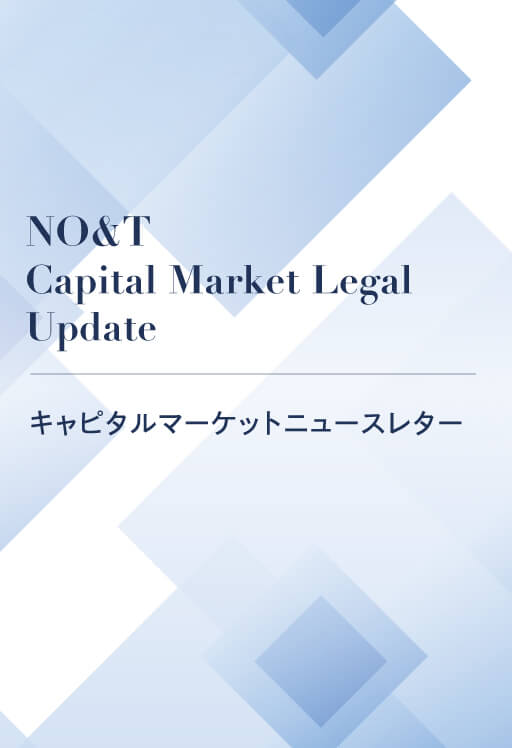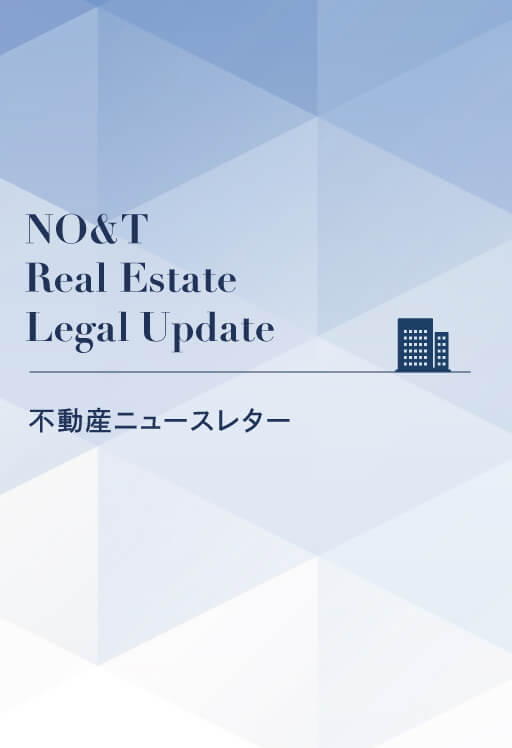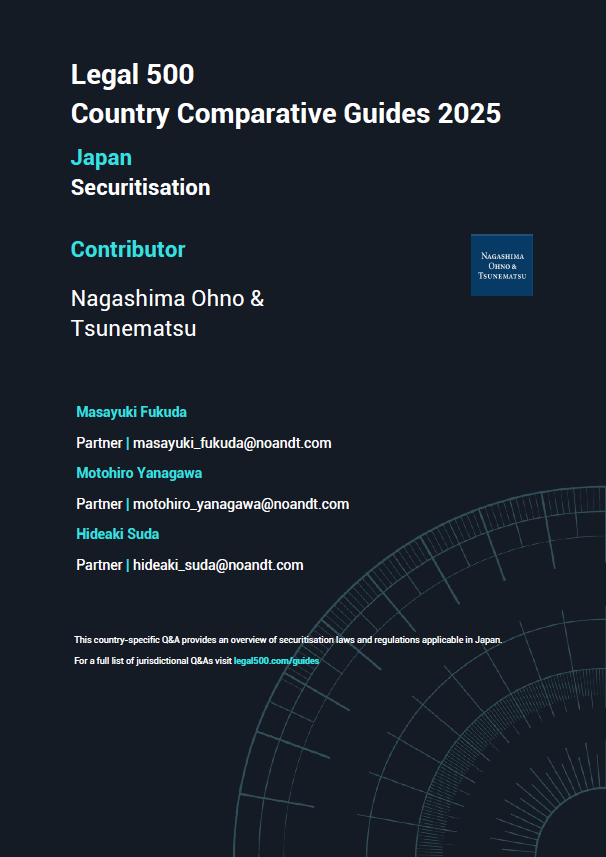
NO&T Japan Legal Update
Crowdfunding is a method of raising money to finance projects and businesses that enables fundraisers to collect money from a large number of people via online platforms. There exists a variety of crowdfunding platforms serving industries like technology, the arts, and social causes, as well as real estate. Although there are several types of crowdfunding for investment in the real estate sector (e.g., donation, lending and others), this article focuses on regulations governing equity-based real estate crowdfunding in Japan, focusing on the Act on Specified Joint Real Estate Venture.
The Act on Specified Joint Real Estate Venture (hereinafter the “ASJREV”) (sometimes also referred to as the “Futoku-hou” or “FTK law” from its Japanese abbreviation) was enacted in 1994. As the name suggests, the purpose of the ASJREV was to ensure the sound operation of real estate joint ventures, i.e., businesses in which investors are invited to invest, typically in the form of a partnership or silent partnership (Tokumei Kumiai), in the purchase, sale or lease of real estate and to distribute the profits from such investment.
Typically, purchasing real estate for investment requires a large amount of capital and is not easily affordable by general investors. In order to broaden the base of the potential investor class, small-lot real estate products were introduced in the 1980s, in which a piece of real estate is divided into smaller lots and invested in jointly by several investors. By reducing the amount of real estate investment to small lots, general investors may be able to invest in real estate in a casual manner. The government was concerned, however, about the potential bankruptcy of inefficient asset managers, which could result in significant investor losses. In fact, following the bursting of the asset price bubble in the early 1990s in Japan, many investors suffered such losses, increasing the need for appropriate regulation of this type of collective investment scheme. The result was the enactment of the ASJREV in 1994. After the enactment of the ASJREV, it was partially amended in 2013, 2017 and 2023; the 2017 amendment was, among other things, a response to the growing demand for crowdfunding in the real estate industry.
Under the ASJREV, depending on the type of the real estate business scheme and the principal place of business, permission from the Commissioner of the Financial Services Agency, the Minister of the Ministry of Land, Infrastructure, Transport and Tourism (“MLIT”), or the prefectural governor is required to operate a real estate specified joint enterprise.
Due to these regulations, the hurdles for entering into a real estate specified joint venture are relatively high. In order to obtain a license, the capitalization and qualifications must be scrutinized by the competent authority, and the company must be recognized as capable of sound management. The ASJREV has a significant role in ensuring that investors can invest in real estate specified joint ventures with peace of mind.
At an early stage, the ASJREV was particularly strictly regulated in order to reduce investor risk. While this ensured the safety of investments, it was accompanied by the risk of investment transactions becoming rigid and unattractive due to the small number of operators qualified to operate them. The ASJREV was later amended, however, to relax regulatory requirements so that real estate joint enterprises could spread while maintaining the investor protection concept.
The key amendments to the ASJREV are as follows:
The key amendment in 2013 was the introduction of a qualifying investment structure utilizing a special purpose company (SPC), i.e., a company established for the sole purpose of the real estate specified joint enterprise. As a result of the amendment to the ASJREV, such an SPC can enter into real estate specified joint enterprise without permission from the relevant authority, provided certain notifications are given. This allowed for the GK-TK scheme, a typical real estate investment scheme comprised of a limited liability company (Godo Kaisha) and a silent partnership (Tokumei Kumiai), to be used without a trust arrangement in practice. This exception was granted on the condition that the SPC outsource its operations to companies with the required license for real estate specified joint enterprise (a company with a license for type three and type four). However, this 2013 amendment to the ASJREV still left high barriers in place due to the setup costs and the license requirements, such as the investors requirement (i.e., that only accredited investors were able to invest in this structure).
The amendment in 2013 was groundbreaking in that it introduced the possibility of using an SPC, but the results were not as positive as initially anticipated. Therefore, multifaceted legal changes were made in 2017. The following points summarize the key regulatory impacts of these changes:
This has allowed for the formation of various types of real estate specified joint ventures and has created an environment for electronic transactions for crowdfunding.
In 2019, MLIT further strengthened support for crowdfunding. The ministry’s goal was to make crowdfunding more user-friendly while reducing online risk for investors. Specifically, MLIT prepared guidelines for electronic transaction operations and established multiple rules for businesses to follow, clarifying the amended ASJREV. These rules include proper display of information on the company’s website, the establishment of an examination department, and measures to deal with information leaks.
In response to the amendment to the Financial Instruments and Exchange Act (“FIEA”) that introduced security token offering (“STO”) regulations, ASJREV has been amended to regulate the real estate specified joint venture business more consistently in 2023.
Specifically, the tokenized collective investment scheme under the ASJREV was included as a “security” under the FIEA (real estate STO). STOs are expected to be utilized as a more cost-efficient form of securities offering, real estate STOs under the ASJREV are expected to be a new digitalized form of real estate securitization.
The size of the real estate crowdfunding market is expected to grow over the coming years in Japan and globally. One of the main factors to drive market growth in Japan is favorable regulations for real estate crowdfunding. Although there are still various hurdles such as market volatility, liquidity and complex regulations, the track record of existing players and technological innovation may lead to the continued growth of real estate crowdfunding.
This newsletter is given as general information for reference purposes only and therefore does not constitute our firm’s legal advice. Any opinion stated in this newsletter is a personal view of the author(s) and not our firm’s official view. For any specific matter or legal issue, please do not rely on this newsletter but make sure to consult a legal adviser. We would be delighted to answer your questions, if any.


Ryuji Oka


Yothin Intaraprasong, Theerada Temiyasathit (Co-author)


Yuichi Miyashita, Miho Susuki (Co-author)


Makoto Saito, Shinichiro Horaguchi, Yoshihisa Watanabe, Ramsay Randall (Co-author)


Ryuji Oka


Takehito Matsumoto


(March 2025)
Masayuki Fukuda, Motohiro Yanagawa, Hideaki Suda (Co-author)


(October 2024)
Keiko Shimizu, Koichiro Yoshimura (Co-author)


Masato Kumeuchi, Kodai Ebihara (Co-author)


Hoai Tran


Makoto Saito, Shinichiro Horaguchi, Yoshihisa Watanabe, Ramsay Randall (Co-author)


Makoto Saito, Shinichiro Horaguchi, Yoshihisa Watanabe, Ramsay Randall (Co-author)


Masato Kumeuchi, Kodai Ebihara (Co-author)


Hoai Tran


Makoto Saito, Shinichiro Horaguchi, Yoshihisa Watanabe, Ramsay Randall (Co-author)


Makoto Saito, Shinichiro Horaguchi, Yoshihisa Watanabe, Ramsay Randall (Co-author)


Makoto Saito, Shinichiro Horaguchi, Yoshihisa Watanabe, Ramsay Randall (Co-author)


Makoto Saito, Shinichiro Horaguchi, Yoshihisa Watanabe, Ramsay Randall (Co-author)


Takehito Matsumoto


Yuan Yao Lee